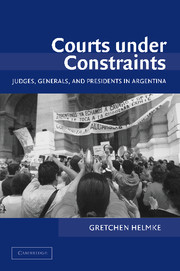Book contents
- Frontmatter
- Contents
- List of Tables
- List of Figures
- Preface and Acknowledgments
- 1 RULING AGAINST THE RULERS
- 2 THE LOGIC OF STRATEGIC DEFECTION
- 3 A THEORY OF COURT-EXECUTIVE RELATIONS: INSECURE TENURE, INCOMPLETE INFORMATION, AND STRATEGIC BEHAVIOR
- 4 JUDGES, GENERALS, AND PRESIDENTS: INSTITUTIONAL INSECURITY ON THE ARGENTINE SUPREME COURT, 1976–1999
- 5 THE REVERSE LEGAL-POLITICAL CYCLE: AN ANALYSIS OF DECISION MAKING ON THE ARGENTINE SUPREME COURT
- 6 THE DYNAMICS OF DEFECTION: HUMAN RIGHTS, CIVIL LIBERTIES, AND PRESIDENTIAL POWER
- 7 CONCLUSION: BROADER LESSONS AND FUTURE DIRECTIONS
- Appendix A Overview of the Federal Argentine Judiciary and the Argentine Supreme Court
- Appendix B The Argentine Supreme Court Decisions Data Set
- Appendix C Equilibria Proofs
- References
- Index
Appendix A - Overview of the Federal Argentine Judiciary and the Argentine Supreme Court
Published online by Cambridge University Press: 24 July 2009
- Frontmatter
- Contents
- List of Tables
- List of Figures
- Preface and Acknowledgments
- 1 RULING AGAINST THE RULERS
- 2 THE LOGIC OF STRATEGIC DEFECTION
- 3 A THEORY OF COURT-EXECUTIVE RELATIONS: INSECURE TENURE, INCOMPLETE INFORMATION, AND STRATEGIC BEHAVIOR
- 4 JUDGES, GENERALS, AND PRESIDENTS: INSTITUTIONAL INSECURITY ON THE ARGENTINE SUPREME COURT, 1976–1999
- 5 THE REVERSE LEGAL-POLITICAL CYCLE: AN ANALYSIS OF DECISION MAKING ON THE ARGENTINE SUPREME COURT
- 6 THE DYNAMICS OF DEFECTION: HUMAN RIGHTS, CIVIL LIBERTIES, AND PRESIDENTIAL POWER
- 7 CONCLUSION: BROADER LESSONS AND FUTURE DIRECTIONS
- Appendix A Overview of the Federal Argentine Judiciary and the Argentine Supreme Court
- Appendix B The Argentine Supreme Court Decisions Data Set
- Appendix C Equilibria Proofs
- References
- Index
Summary
Organization
The Argentine Supreme Court (Corte Suprema de Justicia de la Nación) stands at the head of a federal judiciary currently composed of a total of 343 first-instance courts (juzgados), 42 oral tribunals (tribunales orales), and 24 appeals courts (cámaras). Article 94 of the 1853 Constitution establishes that the number of lower courts shall be determined by Congress. The organization of the federal courts is regulated by decree law 1285/58, which specifies the areas of specialization for each of the various tribunals. Currently, the lower federal courts are divided into separate tribunals for administrative law (Fuero Contensiosa Administrativa and Fuero Federal de la Seguridad Social), criminal law (Fuero Criminal y Correccional Federal, Fuero Penal Oral Federal de la Capital Federal, Fuero Penal Oral Federal del Interior), civil and commercial law (Fuero Civil y Comercial Federal), and electoral law (Fuero Electoral). The twenty-four Federal Courts of Appeals are located in fifteen of the country's twenty-three provinces.
Jurisdiction and Precedent
The jurisdiction and powers of the federal courts are determined by the Constitution of 1853 – recently reformed in 1994 – the Congress, and through the Supreme Court's own jurisprudence. The Constitution's Articles 94, 100, 101, and 67, section 11, regulate the jurisdiction of the federal judiciary. As in the United States, the main task of the Argentine federal courts is to resolve all “federal questions,” which includes all questions of interpretation that emerge from laws passed by the Congress and cases whereby a right of the Constitution has been allegedly violated (Miller et al. et al. 1995: 411; Molinelli et al. 1999).
- Type
- Chapter
- Information
- Courts under ConstraintsJudges, Generals, and Presidents in Argentina, pp. 175 - 181Publisher: Cambridge University PressPrint publication year: 2004



